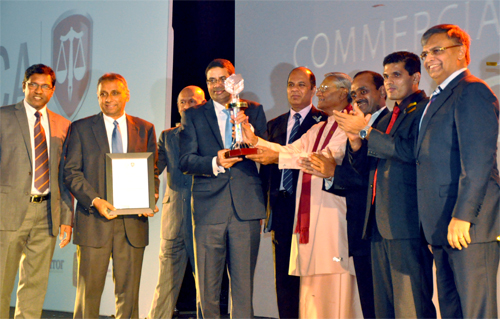Sri Lanka’s private sector should work together without individually cutting deals
Sri Lanka’s private sector should be ‘more collective’ in their approach to business and not ‘cut’ deals on their own, a top economist says.
“The corporate sector doesn’t do enough collective action. They want to cut a deal on their own, because they think in terms of the 21 million (people) market and compete with each other to get a slice of this,” Dr. Indrajit Coomaraswamy, Former Director, Economic Affairs Division at the Commonwealth Secretariat said, delivering his thought provoking speech at the 2013 Annual Report Awards of the Institute of Charted Accountant of Sri Lanka (CA) recently.

Commercial Bank Chairman Dinesh Weerakkody (centre) and Managing Director Ravi Dias receiving the award. Pic by Mangala Weerasekera
Dr. Coomaraswamy, who was the guest of honour, pointed out that countries in East and South East Asia are more successful than South Asia as they were more strategic in terms of economic policy. They took a 10 to 20- year perspective, whereas ‘we’ in South Asia were much more transactional and driven by short-term political aspirations. “It is important to co-operate to compete,” he said, quoting Mahathir Mohamad, Malaysia’s fourth prime minister.
“It’s also important to work as Sri Lanka Incorporated.” He said that on pillars relating to the Global Competitive Index (GCI), Sri Lanka’s composite ranking is 65, but on the business sophistication pillar, it’s at 34.
“On financial market development we are 41 and in innovation pillar we are at 48. The quality and strength private sector is measured on those pillars and we have done well as we-re on the top 50,” he said.
Best set of circumstances
He noted that sans the conflict, Sri Lanka has the best set of circumstances. “The economic geography is conducive as we are located in Asia which is the most dynamic region in the global economy,” he said, pointing out that the centre of gravity in the global economy is shifting from the West to the East. He noted that Sri Lanka’s savings investment gap needs to be 34 per cent of GDP to reach 8 per cent growth.
“Now we are relying too much on borrowing particularly commercial borrowing to fill this gap. We need to attract more non-debt creating inflows – particularly FDI”, he stressed. Dr. Coomaraswamy said that enhancing export performance in also a challenge for Sri Lanka, pointing out that now exports are at 17 percent GDP.
“In an economy of just 21 million people with purchasing power based, on $3,000 per capita income, it is not possible to reach 7.5 per cent growth target without enhancing export performance.”
Dr. Coomaraswamy recapped that as a country Sri Lanka needs to focus on four key aspects: need to make strategic decisions, to achieve the 34 per cent savings on investments; need to attract more foreign direct investments, increase exports and provide the necessary vocational training to meet the requirements in the job market. He went on to say that the best chances and best opportunities are out there and the private and public sector should collaborate to attract these opportunities.
Commercial Bank won the honours, bagging the Gold for Overall Excellence in annual reporting while John Keells Holdings Plc won the Silver and HNB Assurance Plc and Seylan Bank Plc were joint Bronze winners.



